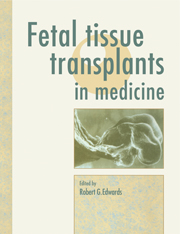Book contents
- Frontmatter
- Contents
- List of contributors
- Preface
- 1 Differentiation and transplantation of embryonic cells in mammals
- 2 Organogenesis and central nervous system development
- 3 Experimental human hematopoiesis in immunodeficient SCID mice engrafted with fetal blood-forming organs
- 4 Ontogeny of human T- and B-cell immunity
- 5 The procurement of human fetal tissues for clinical transplantation. Practice and problems
- 6 Transplantation of fetal haemopoietic and lymphopoietic cells in humans, with special reference to in utero transplantation
- 7 The biology of fetal brain tissue grafts: from mouse to man
- 8 Clinical results of transplanting fetal pancreas
- 9 The suitability of fetal and infantile donors for corneal transplantation
- 10 Transplantation of ovaries and testes
- 11 Cell grafting and gene therapy in metabolic diseases
- 12 The low temperature preservation of fetal cells
- 13 Law and ethics of transplanting fetal tissue
- Appendix: Code of practice on the use of fetuses and fetal material in research and treatment
- Brief bibliography on various aspects of transplanting fetal 337 tissue
- Index
13 - Law and ethics of transplanting fetal tissue
- Frontmatter
- Contents
- List of contributors
- Preface
- 1 Differentiation and transplantation of embryonic cells in mammals
- 2 Organogenesis and central nervous system development
- 3 Experimental human hematopoiesis in immunodeficient SCID mice engrafted with fetal blood-forming organs
- 4 Ontogeny of human T- and B-cell immunity
- 5 The procurement of human fetal tissues for clinical transplantation. Practice and problems
- 6 Transplantation of fetal haemopoietic and lymphopoietic cells in humans, with special reference to in utero transplantation
- 7 The biology of fetal brain tissue grafts: from mouse to man
- 8 Clinical results of transplanting fetal pancreas
- 9 The suitability of fetal and infantile donors for corneal transplantation
- 10 Transplantation of ovaries and testes
- 11 Cell grafting and gene therapy in metabolic diseases
- 12 The low temperature preservation of fetal cells
- 13 Law and ethics of transplanting fetal tissue
- Appendix: Code of practice on the use of fetuses and fetal material in research and treatment
- Brief bibliography on various aspects of transplanting fetal 337 tissue
- Index
Summary
IT is IMPORTANT to recognize that the legal and the ethical are distinct, and only partially overlapping, categories. Lying is always ethically dubious but it becomes illegal only in certain circumstances, such as when one is under oath. Moral theory holds that in certain situations there can be an ethical obligation to break unjust laws. The mechanism of written statutes and the decisions of the courts is designed to provide ascertainable answers to legal problems. Ethical judgements, on the other hand, call for acts of discernment on which there may well not be universal agreement. Not only may the principles be in dispute but also many moral decisions involve the weighing of conflicting claims (the welfare of the mother against the welfare of the fetus, for example), which different people may assess in different ways. Consensus is sometimes difficult to achieve in the moral realm. Because of this, it should not be assumed that all adherents of a particular religious tradition hold exactly similar views on all moral issues.
While there are inescapable acts of individual judgement involved in ethical decisions, nevertheless, it is desirable that conclusions should be reached in ways that result in as consistent a practice as possible. A way of achieving this in a given area of activity is to formulate a code of practice, providing general guidelines within which individual decisions are to be made. In the area of the transplantation of fetal tissue, the Code of Practice currently operative in Britain is that recommended by the Government-appointed Committee to Review the Guidance on the Research Use of Fetuses and Fetal Material (FFMC), which reported in July 1989 (FFMC, 1989). Its Code of Practice is reproduced in the Appendix.
In English law, the fetus, while in the uterus, is not a legal person. A fetus which is born and lives ex utero, even if only briefly, becomes a legal person and acquires all the rights and status thereto attached.
A fetus which dies in utero, either naturally or as the result of a therapeutic abortion, has not been a legal person and, in consequence, the provisions of the Human Tissue Act (1961) do not apply to it. There is some uncertainty about what, if any, legal requirements there are in relation to consent for the use of material derived from such a fetus.
- Type
- Chapter
- Information
- Fetal Tissue Transplants in Medicine , pp. 323 - 330Publisher: Cambridge University PressPrint publication year: 1992



